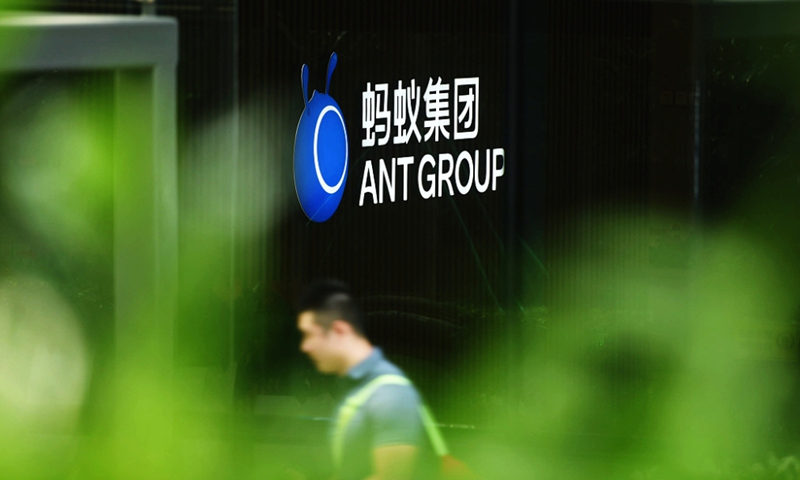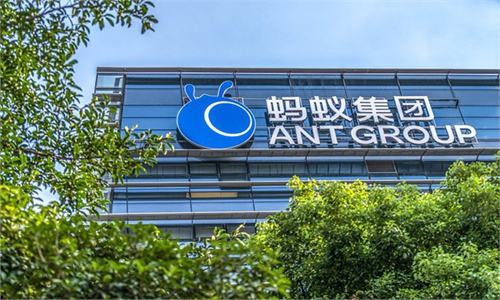Ant Group is 'devoted to clearing up mess' after IPO suspension
Government to heighten scrutiny to protect free competition

Photo taken on Oct. 26, 2020 shows Ant Group logo on the buildings of Hangzhou headquarters in Hangzhou, east China's Zhejiang Province. (VCG)
The Chinese internet sector, following a decade of boom times in a relaxed environment for regulatory scrutiny, is facing a new task: how to guarantee growth based on innovation amid heightened regulation, which has become increasingly necessary to avert systemic risks.
New-economy companies need to foster the ability as early as possible to strike a balance between innovation and regulatory compliance, and it should be understood that the pursuit of sustainable growth in the long term is inseparable from the law and regulation, industry analysts told the Global Times on Tuesday.
Executive chairman of Alibaba's financial affiliate Ant Group Eric Jing said during an industry forum on Tuesday that the company has come to acknowledge that maintaining financial security and preventing financial risks are the prerequisites for technology innovation and development in the financial sector.
"Ant serves many consumers, as well as small and micro-sized enterprises. In maintaining financial security and preventing financial risks, we should raise the level of security and require higher standards, as well as stricter regulations," Jing said.
This is the first time that a top executive of Ant Group has spoken out after the suspension of its IPOs one month ago.
Chinese stock exchanges in November announced they would suspend a planned dual listing by Ant Group, which had been widely expected to become the world's biggest IPO ever, as part of what experts call a broad push to tighten regulations in the financial sector, particularly online lending, to protect the vast investors' interests.
China's fin-tech sector has progressed in an era of reform and opening-up and accelerating innovations, and Ant has been a beneficiary of the time, so its development cannot be separated from government regulation, which is aimed at a healthier and more sustainable development, Jing said.
In the past month, the company has been dealing with the aftermath of the IPO suspension under the guidance of the regulators, Jing said, adding that it will continue to increase investment in technological innovation, especially focusing on research and development in core technologies, and intensifying the full opening of technology to help financial institutions in their digital transformation.
"It should be emphasized that regulation does not mean setting curbs on technological innovation, although there is some contradictory relationship between the two in the short term," Dong Shaopeng, a senior research fellow at the Chongyang Institute for Financial Studies of Renmin University of China, told the Global Times on Tuesday.
"It takes time to create a mature regulatory framework and we should make all-out efforts toward that," Dong said.
As more Chinese technology giants go global and their businesses in the domestic market grow wildly based on mass personal data, proper regulation needs to be in place, said Chen Bo, director of the Digital Finance Research Center at the Central University of Finance and Economics.
"Expanding without a bottom line will only expose firms to more potential risks," Chen told the Global Times on Tuesday.
Apart from the fin-tech sector, Chinese authorities have also put the anti-monopoly program on the agenda, a part of China's internet growth that has lagged behind for many years.
In the latest move, three companies - Alibaba Investment, Tencent-backed literature platform China Literature and express locker solutions provider Shenzhen Hive Box Co - were each fined 500,000 yuan ($76,465) for breaching the country's Anti-monopoly Law on Monday, according to the State Administration of Market Regulation (SAMR).
The market regulator also said it would look into a merger between game livestreaming firms Huya and DouYu announced in October. Tencent has been a major investor in both firms.
Like banks, which are "too big to fall," giant digital firms are likely to from "too big to spin off" businesses, Zhu Guangyao, former vice finance minister, told the forum on Tuesday.
"How to impose reasonable regulations on these companies has posed challenges to the world," said Zhu.
"Business spin-offs for big Chinese technology companies have become a trend in recent years, and it is an effective tool for regulating a monopoly," said Liu Dingding, a Beijing-based independent internet analyst.
Compared with China's belated anti-trust implementation, strict regulation on internet giants in the US and Europe has become normal over the years.
Technology giants including Google, Amazon and Apple could face fines as high as 10 percent of annual revenue if they don't comply with new EU rules on data usage, Bloomberg News reported.
The EU is readying its own next wave of anti-trust lawsuits by formally beginning to consider the Digital Markets Act from Tuesday, which would give regulators a new basis to go after digital platforms for alleged anticompetitive practices.


